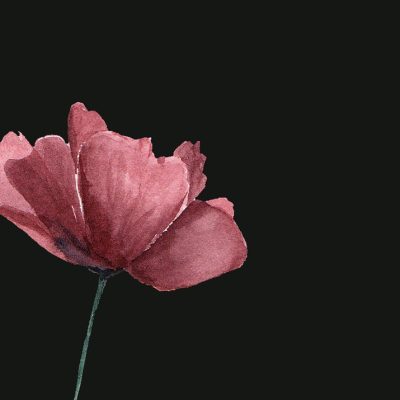by Ian Johnson
Support independent, non-corporate media.
Donate here!

Nobody mourned Uncle Martin seriously because his life was a joke. The heavens concurred, pissing on the dark straggle that trudged to the funeral over the humped stone bridge with a chunk knocked out of it, up the sodden slope to their chocolate box church. The hill he chose to die near.
Kai seethed at the back of the procession in his court shoes and suit. The eldest grandson, the dears and the dear oh dears who once looked at him askance now blotted him out – not a glance, not a flicker. They remembered him from smashed windows and filched purses. He wasn’t to be asked after or cooed over, he was to be managed.
He didn’t remember anyone being this old, the rusted automatons stirred to life by the warming whir of the scrap furnace.
Most were there to show face. They’d sit at the back. Have a ham and please pudding sandwich, please. A half day away from their bucolic rot to oil themselves on the rags of God’s grace.
Kai’s mother Maria stuttered back from the creaking throng, unfolding the tissue-thin scribblings of what she’d been called on to testify, reciting the stodgy scripture to herself.
“You all knew Martin, my brother — I don’t need to tell you — you all knew him, in a way — what I want to say — need to say — important to say, about my brother — he was a good man.”
The Village knew Martin as the big balding lump on the pea-green ride-on lawnmower – property of the parish council – who would maintain and store the contraption and keep The Green thickly striped. Man and machine, beaming and gleaming at blow-ins, and locals, and passers through. His skull booming, laugh pealing. His great freckled head peeling.
They knew him as the lean-to in the bar of The Traveller’s Rest (The Trav’ to The Village) post teatime, draining the pumps effortlessly but never ending up unsteady or otherwise interesting. Roaring and nodding along, as he did, to raucous anecdotes or penned in opinions from the busting plaid shirts of the country set, the grifters and the grafters alike.
A flavourless mixer, he was. Nobody’s poison.
They might have known him, more unkindly, as the youngest son, who’d stuck to his mother Queenie, widowed longer than married, up at the old parsonage. Making a living doing something related to his father’s shrewd investments – a man of mystery who jaunted through South America and India and left curious ruddy bastards with receding hairlines in Sao Paulo and Mumbai.
But now they knew him as dead. Some form of heart disease; another hereditary curse. Barely fifty, poor sod. Queenie had tried to wake him post afternoon nap in their bay windowed poofy armchairs where they watched The Green grow. But he’d gone, before her, which was such a shame, and laughable, and served the lazy bugger right.
Rehearsals over, Maria dutifully resumed pushing her mother Queenie in her slick, black handled wheelchair, the iron spokes clarting up from the mud. She’d insisted on the ritual. Coffee at the parsonage, cross The Green, sloping upwards. Nostalgic chatter about The Hunt, The Feast, scarecrow competitions, how they should be able to display Golliwogs in the Post Office, when it was all coming back?
Sans her Martin, who would keep The Green neat? Who would marshal The Bike Race?
Uncle Martin liked John Wayne films, where uppity women got a back hander from a suede glove. And James Bond, the old ones; Connery, and Moore and, at a push, Dalton. And the AC Shelby Cobra his Dad bequeathed him; a classic sports car, red with a racing stripe, that he kept in a lock up down a dust track by the big grain silo. He’d tinker with it and take it out – the back roads to town and back – once a week so it didn’t seize up. To the occasional meet, if they weren’t too far, where he’d sweat and beam and go ‘dunno’.
Kai shared that passion with him, and the party trick of recognising cars from the sound of their engine. He took his tearaway nephew to the meets, until the compulsive adolescent saboteur rived at the gear stick and tore away the irreplaceable head. But Martin still let him help out at the lock up, and any other kid that asked, until he didn’t.
Until he wasn’t allowed.
That year in prison was a gnarly facial scar, but The Village chose not to know him by that, like some mass benign anti-hysteria. Rather than looking the other way, they decided to look squarely through him, like a gouged hole in the fence. The Green keeper. Queenie’s lad. The oddball. The queer un.
The boy with him that night had severed his spinal cord with the impact, when they’d swerved too late for Mrs Malady, off on one of her demented moonlit walks. They’d clipped the bridge’s parapet, spinning down the slope and wrapping the waxed metal confection around a hundred-year-old oak Mrs Malady remembered as a sapling.
Until she didn’t.
Martin, who filled the bucket seats like a cloud of flesh, was unharmed, the ten pints he’d demolished in The Trav’ an hour earlier numbing the shock.
He took it all in his lumbering stride, nodding dumbly at the coppers by the roadside, The Village ablaze with upstairs windows and torches, all come out to nose and neb. It was Queenie’s son, you know, the one who cuts The Green, carted off. The roaring blades of two air ambulances for the broken pins, the oldest shattered beyond repair.
Mrs Malady amicably had no one, but how the mother of the boy hadn’t gone for blood?! How The Village hadn’t folded itself away from him, instead choosing again to know him for this and that or not at all. Letting him lean or beam or nod along. Letting him keep The Green trim and watching the comings and goings from his poofy chair between snatches of The Man Who Shot Liberty Vallance from the telly in the corner after he’d carried Queenie to bed. Doing his nobody business diligently, like before, only with a hung head until the day he died.
*
Kai smoked alone by the tombstones, kicking at the dry-stone wall that separated the weed infested graveyard from the brown beck beyond. Amongst the sticky undergrowth, Henrietta Malady herself. Unloved, but enough of a God-botherer to sneak a plot in with its corroded, flowerless colander vase.
Kai flicked the dying butt into the vicar’s garden, trying to hit the woodpile.
Inside, he stood at the back with the seized up crowd donning worn grey suits from funerals past and farmers’ shindigs. His mother sat at the front with Queenie, who quivered like rice paper, clamping an origami death grip on her wantaway daughter.
The career woman who escaped the fumbling boys behind barns and in the back fields to become accomplished with caps and gowns, and promotions, conference calls and business trips.
Maria met an equal. Had Kai. Found her equal unequal. Made sacrifices as a single mother, just her and her elbows, even when the cherished softness of motherhood became dry and calloused.
Kai made sure of that, like when the money for the cancer kids ended up in his locker.
Uncle Martin had agreed to run him and Maria to the Magistrates in the sparkling Cobra, as moral support and to salvage a sore memory for the boy. Kai rocked up late, as high and wild as a kite in a hurricane. In the cramped back seat, his mother’s tongue lashed and berated him until he’d screamed in her face.
Uncle Martin wasn’t a violent man, but still, he pulled Kai out. Pinned his arms to a wall, as if straightening a drab watercolour of a Spitfire, while his mother landed the limp finishing blow, her delicate head wagging like a falling feather.
“I won’t leave you, Kai. If this is my lot, I won’t leave you.”
The hill she chose to die on.
There was that divvy again.
In the church, gurning at him – another legless wonder in a wheelchair, but his was tricked out. A hybrid model with thick treads, racing red with go-faster stripes. Kai had seen him, malingering alongside the party leaders. Making short work of the muddy gradients.
He was younger than the others. Not in a virile way – the gut and the receding hairline made sure of that – but relatively.
He was looking at him. He was. And he looked fascinated; that gawping smile, that searching, archly furrowed squint.
Maybe he was simple.
Maria ascended; her notes folded in a velvet gloved grip.
Her quaking voice squeaked “You all knew Martin. I don’t need to tell you who he was, you all knew him in your own way. What I wanted to say about my brother. What I wanted you all to know… because it’s important to know. He was a good man.”
One of the old frayed tweedy boys, not mithered enough to even dress for the dispatching, caught the eye of his lemon faced wife.
Aye aye. Good enough for her majesty’s pleasure, mebees.
“He had a goodness to him,” Maria rallied, “that was almost supernatural. Family was everything to him. It was the be all and end all. You hear that a lot, but he…”
Her reed broke, the dam of tears threatening to burst. She looked back towards her boy. Got nothing. Then, to Chuckles in the wheelchair. A nod passed between them. The grim image burnt into Kai that they were shagging, somehow. This was the new guy. A new low, even for her.
“He lived a life of sacrifice,” she bounced off the rafters. “And that’s not a small thing. He wasn’t a small person. And his life meant something because of that. ‘Sin is the failure to bother to love’. You couldn’t say that about Martin.”
The defiance in her voice, the surety, killed any murmurs. Any nudging ripples. Even if it wasn’t meant, it was taken. A trickle of gormless benevolence seeped into the mourners, elbows becoming shoulders.
Inevitably, she ruined it by talking about The Green and the Cobra (RIP) and John Wayne (RIP) and what was left of Queenie.
Some life. Some love. Some sacrifice.
Back at the pew, Wheelchair Wally put his hand in her lap, like a puppy’s head. She stroked it, lingering in the crevices of his chubby fingers.
*
If you were meandering, rubber legged, from The Trav’ at chucking out time, you’d get the full panoramic of The Village. Its rugged lushness, unblighted by new builds. The one road to the county line boasting ‘The Land of the Prince Bishops’, going and gone via the clipped stone bridge, strung with solar fairy lights, repelling the far faraway darkness.
As a venue for the last time he’d be mentioned in earnest, it’s what he would have wanted.
The bar heaved and steamed with well-fed bodies and bony old birds. Silver platters lay lousy with stout butties, thickly buttered. Pints of festering, half-drained bitter and hoary laughter that petered away to wet hacking coughs. A trestle table, the tottering shrine to Martin himself, knocked by the hips of half-cut mourners enjoying the spoils of acquaintance.
A sliding door led to the cracked patio with peeling tables, a canvas awning sheltering the smoking lepers who found refuge around a whirring heat lamp.
Kai slipped out and lit up. He scraped the caked mud from his brogues on the edge of a blossoming planter with a slopping fury.
“There he is. Young gun.”
He spoke from Kai’s blind spot, wedged into a moss encrusted corner of the yard in his constant chair. Chuckles. The mong from the front.
“What do you reckon about all of this?” he continued with cloying familiarity.
“All what?”
“Uncle Martin’s send off?”
“I dunno. Usual shit show.”
The man clapped in childish glee, raising a black box to his lips and exhaling an endless cloud of smoke that smelt like the leaked juice of some sickly, exotic fruit. It engulfed Kai, as he pulled at his own cigarette, the ember flashing like a brake light in the fog.
“What would you have done, in his place?” the man drawled, as if to himself. “Would you not have just left? Fled the scene, like, before the bobbies turned up?”
“Nah”, Kai shuffled, spitting through his front teeth. “I would have taken my licks, like he did.”
“Yeah, but, would you, though? Would you? Because he didn’t just not take off, he did the complete opposite. In all the carnage and that.”
“Him being out of his skull bladdered might have had something to do with it.”
“Nah. It’s cos of what your Mam said up there. His goodness.”
“Right-o”, Kai clenched, trying to free himself from the crippled dragon, his curious clouds pouring from flared nostrils, opaque and obtuse.
If he calls me son, I’ll crack him one.
“Aye aye, I know you don’t know, but you would think that too, what your Mam said, if you knew. You would.”
“What are you on about?”, Kai wafted and squinted to get a clearer look at his puckering leech through the haze.
“They call me Wheelz with a zed, the lads at work. Can you believe that? I don’t mind, or I don’t think I do. Would you mind? Or would you be pissed off?”
“I dunno. I’m not in a wheelchair, am I?”
“Aye, but would you mind? You being you? Hypothetically?”
Kai gobbed again, pretending to ponder the slim hand empathy had dealt him.
“I’d probably smash their teeth in.”
“But I can’t reach, can I?!” the overripe toddler clapped again, with a creaking cackle. “Y-y-you…” he stuttered composing himself “you want to be a rally car driver.”
“You what, mate?” Kai winced. “I don’t, like. Did she tell you that? I did when I was about seven, mebees.”
“Aye, out loud, but you still do a little bit. You being you. Pretty unlikely, you’d have to admit!”
Kai felt the easy hotness rise like fire from the shot engine in his chest.
“Pipe down, will you?”
“I mean,” the man revved up, undeterred, “everyone looks back at their life and thinks what the – excuse my language – what the beeping beep was that all about. I’m not interested in that as much as what you think. It being what it is?”
Kai sullenly turned, trying to keep his head above the smoke. His fag wasn’t going down. It still glowed, but barely; a fairy light through a rain stroked windshield.
Was it out? If he stubbed it out, he’d be admitting defeat. Placing himself lower than him or some other cretin, or anyone. It consumed his private moments, it always had, igniting that need to break in and take off.
“I think you can learn goodness, though”, the man battered on relentlessly. “You can make it your lot, know what I mean?”
“I think you’re a mug, mate,” Kai croaked. He squared himself, ready to go. He’d done worse. He’d cracked weaker.
“Aye, mebees. And I thought you’d think that. But I’m alright with it. I’ve got a little job, y’know. I fix bikes, like, mountain bikes. I put them together for people. It’s not cars, but maybe it might turn into that. I’m a bit mature for an apprenticeship, but there might be some course I can do or summat. What do you think of that? Would you like that?”
“Why do you keep asking me? I don’t care! I don’t think anything of you or what you want to be!”
“No. No, that’s you, innit? I suppose I just wanted to know. All things considered. Is this alright? Am I doing alright? I’m not a kept man. I had a girlfriend, for a bit. And I went to Barcelona last summer, by myself! Visited the bloody San Siro!”
“You mean the Nou Camp.”
“Ah yeah. My mind isn’t great. I get a bit tied in knots with how things are.”
“Why are you telling me?!” Kai lurched forward, his ready fists balled. “Keep it to yourself! Stop prodding us!”
The man didn’t flinch. He kept regarding him. Feeling him out, like a weak pulse. “I’ve upset you. You don’t think I’m alright.”
“I don’t have to. You’re not part of my life. If you’re trying to get in with my Mam, more fool her.”
The man, as he is, winked wistfully through a reloaded plume of candy infused puffs.
“More fool us. I’ll leave it be, I’m not picking on you, there’s no point. Even though, to be fair, you started it.”
Kai, as he was, didn’t speak because he couldn’t. He felt a lightness to him, the coals in his belly, the molten lead that flowed through his veins, turning to steam. A sense of unbeing filled him, which he hadn’t felt since Uncle Martin carried him like a newborn from the smashed driver’s seat of the Cobra, swapping him over, rubbing his trembling hand with a coarse, calm thumb while the wailing blue storm closed in on them.
In the end, as the half-made version of himself Kai had crudely conjured slipped back into memory, he felt grateful for all the faulty people that tried.
“Kai, darling, are you talking to yourself again?”
Maria stood above her son, her swollen eyes and wonky smile and soothing touch falling on him for some craved validation.
“Come and get one of these sandwiches. They’re your favourite. Your Auntie Ivy will be offended if they go to waste, you know what she’s like.”
Kai sheathed his vape in its custom leather pouch. “Do you think I’ll always be stuck in this thing, Mam?”
Maria braced, sighing her lungs flat, summoning the strength and the words from every tearful ledge she’d talked him down from on rehab wards and neurology waiting rooms.
“Oh son… never say never… but I wouldn’t have thought so. There’s plenty you can do, though, I keep telling you. And I’m proud of who you are! Who you’ve become!”
“Sorry Mam,” Kai huffed, placated by the biting point of her plainly spooned cold comfort. “Give us a push, then.”
She heaved him towards the patio door that muffled the easy ebb and flow of folk together remembering small things that meant more to them and happened differently.
“He was alright wasn’t he, Uncle Martin?” Kai mused, reaching back to squeeze his mother’s hand.
“I mean, yeah, all things considered. As much as you can hope for. Anyway, let’s get you to this buffet. We have been warned – whatever remains must be taken.”









